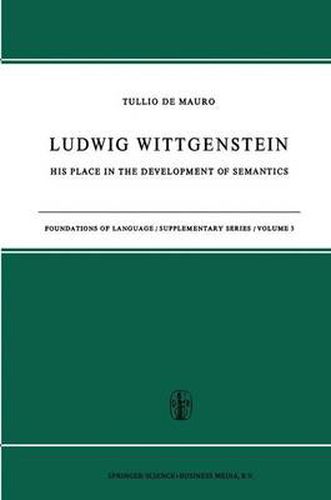Readings Newsletter
Become a Readings Member to make your shopping experience even easier.
Sign in or sign up for free!
You’re not far away from qualifying for FREE standard shipping within Australia
You’ve qualified for FREE standard shipping within Australia
The cart is loading…






This title is printed to order. This book may have been self-published. If so, we cannot guarantee the quality of the content. In the main most books will have gone through the editing process however some may not. We therefore suggest that you be aware of this before ordering this book. If in doubt check either the author or publisher’s details as we are unable to accept any returns unless they are faulty. Please contact us if you have any questions.
Various students of general linguistics and semantics quote and discuss Wittgenstein, among others, OGDEN and RICHARDS (1960), ULLMANN (1951, 1962), PAGLIARO (1952, 1957), WELLS (1960), REGNELL (1960) and 1 ZIFF (1960). For the most part however they quote the Tractatus and not 2 the Philosophical Investigations ; not all of them consider the most important ideas in the Tractatus but often discuss marginal points; above all they often make the discussion of Wittgenstein’s ideas secondary to the development of their own thought. It should be added, moreover, that these students are exceptions. The large majority of language theorists, especially those with a philological background, have almost no know ledge of Wittgenstein’s ideas. One scholar thinks that Wittgenstein’s linguistic philosophy rests upon a grotesque misunderstanding of the workings of language (HERDAN, 1962, Chapter 24). The present book seeks to draw the attention of students of general linguistics and semantics to the thought of both the early and the later Wittgenstein: not only the Philosophical Investigations but also the Tractatus is concerned with everyday language: Wittgenstein was thinking of the propositions of everyday language, when he affirmed that the proposition is a picture of reality (Chapter 1). This conception is very old, it is in fact found in Aristotle and it dominated ancient, mediaeval and modern rationalistic thought; only Locke, Vico and Leibniz criticized it strongly (Chapter 2).
$9.00 standard shipping within Australia
FREE standard shipping within Australia for orders over $100.00
Express & International shipping calculated at checkout
This title is printed to order. This book may have been self-published. If so, we cannot guarantee the quality of the content. In the main most books will have gone through the editing process however some may not. We therefore suggest that you be aware of this before ordering this book. If in doubt check either the author or publisher’s details as we are unable to accept any returns unless they are faulty. Please contact us if you have any questions.
Various students of general linguistics and semantics quote and discuss Wittgenstein, among others, OGDEN and RICHARDS (1960), ULLMANN (1951, 1962), PAGLIARO (1952, 1957), WELLS (1960), REGNELL (1960) and 1 ZIFF (1960). For the most part however they quote the Tractatus and not 2 the Philosophical Investigations ; not all of them consider the most important ideas in the Tractatus but often discuss marginal points; above all they often make the discussion of Wittgenstein’s ideas secondary to the development of their own thought. It should be added, moreover, that these students are exceptions. The large majority of language theorists, especially those with a philological background, have almost no know ledge of Wittgenstein’s ideas. One scholar thinks that Wittgenstein’s linguistic philosophy rests upon a grotesque misunderstanding of the workings of language (HERDAN, 1962, Chapter 24). The present book seeks to draw the attention of students of general linguistics and semantics to the thought of both the early and the later Wittgenstein: not only the Philosophical Investigations but also the Tractatus is concerned with everyday language: Wittgenstein was thinking of the propositions of everyday language, when he affirmed that the proposition is a picture of reality (Chapter 1). This conception is very old, it is in fact found in Aristotle and it dominated ancient, mediaeval and modern rationalistic thought; only Locke, Vico and Leibniz criticized it strongly (Chapter 2).